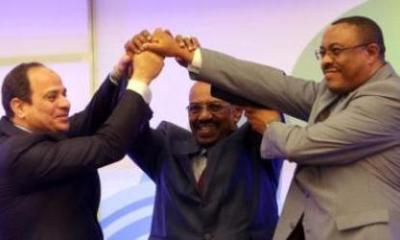Sudan, Egypt and Ethiopia reach agreement on Renaissance Dam
December 29, 2015 (KHARTOUM) – Ministers of irrigation and foreign affairs of Sudan, Egypt and Ethiopia Tuesday have signed a document including several agreements pertaining to the Grand Ethiopian Renaissance Dam (GERD).

He disclosed the three parties have reached an agreement on the consultancy firms which would conduct the technical studies on GERD, noting that the French Artelia and BRL groups have been selected to undertake the dam impact studies.
“It has also been agreed that [the three parties] should commit to the declaration of principles signed by the three countries leaders in Khartoum last March,” he said.
Sudan, Egypt and Ethiopia signed a declaration of principles on the dam project that tacitly approves the dam construction but calls for technical studies aimed at safeguarding the water quotas of the three riparian states.
On September 22 2014, the panel of experts in the three countries proposed the conduction of two additional studies on the dam project, the first one on the effect of the dam on the water quota of Sudan and Egypt and the second one to examine the dam’s ecological, economic and social impacts of the dam on Sudan and Egypt.
Ghandour added the three parties also agreed to continue to cooperate to build trust with regard to the GERD.
For his part, Egypt’s foreign minister Samih Shoukri told reporters that all Egyptians and Sudanese concerns regarding water security and quota have been addressed in the document.
The Ethiopian foreign minister Tedros Adhanom Ghebreyesus, said his country invited Sudan and Egypt to visit the GERD, stressing that Ethiopia has nothing to hide.
“We have nothing to hide, they [Egypt and Sudan] should inspect the dam site and this would promote [our] partnership and build trust. We also extend the invitation to the public diplomacy and the media [in Sudan and Egypt] to visit the [renaissance] dam”, he said.
Spokesman of the Egyptian foreign ministry Ahmed Abu Zaid, for his part, said what has been agreed upon doesn’t represent the end of the discussions on the GERD, pointing that Ethiopia has pledged to meet its commitments in this regard.
He pointed in a press release that the three nations are required to make more efforts in the coming period to ensure continued building of trust and achieve development aspirations of their peoples and protect their interests.
Abu Zaid added the three parties have named the consultancy firms which would carry out the technical studies on the impact of the GERD and agreed on accelerating the completion of those studies.
He said that Ethiopia underlined commitment to implement item 5 of the declaration of principles, noting the item provides that the three parties must agree on the bases for filling and running the dam besides establishing a coordination mechanism.
Abu Zaid added that a technical committee has been formed to offer recommendation by the first week of January on Egypt’s proposal to build two additional holes below the dam.
Meanwhile, the three nations agreed to hold a new meeting involving irrigation and foreign ministers in the first week of February.
It is noteworthy that the twelve-hour meeting of the tripartite committee which took place Monday in Khartoum has dealt with the Egyptian concerns and demands to accelerate the talks and slow down the construction of the GERD.
The multi-billion dollar dam is being constructed on the Blue Nile, about 20 kilometres from the Sudanese border, and has a capacity of 74 billion cubic meters, and is expected to generate electrical power of up to 6,000 megawatts.
Egypt is concerned that the dam could reduce its quota of 55.5 billion cubic meters of the Nile water , while the Ethiopian side maintains that the dam is primarily built to produce electricity and will not harm Sudan and Egypt.
(ST)
